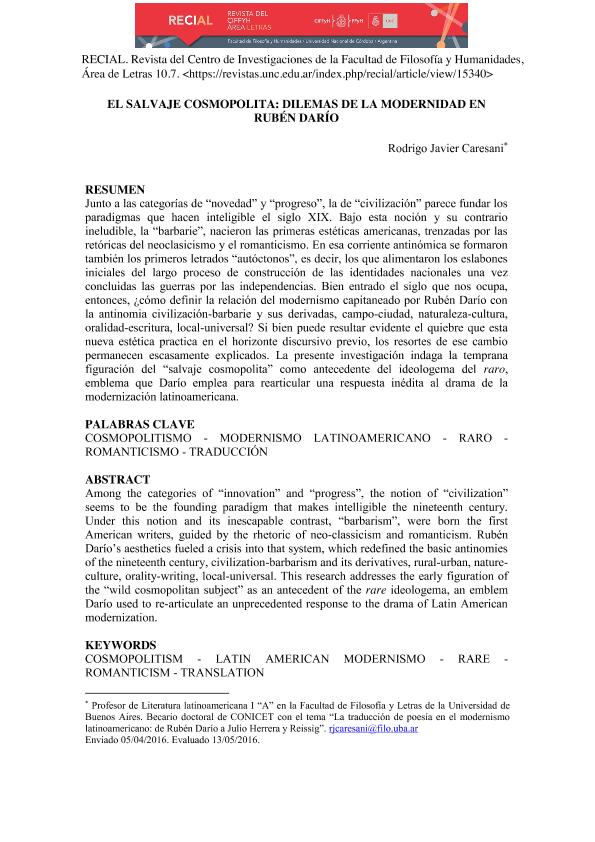Mostrar el registro sencillo del ítem
dc.contributor.author
Caresani, Rodrigo Javier

dc.date.available
2020-10-22T13:36:55Z
dc.date.issued
2016-10
dc.identifier.citation
Caresani, Rodrigo Javier; El salvaje cosmopolita: dilemas de la modernidad en Rubén Darío; Universidad Nacional de Córdoba. Facultad de Filosofía y Humanidades. Centro de Investigaciones "María Saleme de Burnichon"; RECIAL; 7; 10; 10-2016; 6-19
dc.identifier.issn
1853-4112
dc.identifier.uri
http://hdl.handle.net/11336/116310
dc.description.abstract
Junto a las categorías de "novedad" y "progreso", la de "civilización" parece fundar los paradigmas que hacen inteligible el siglo XIX. Bajo esta noción y su contrario ineludible, la "barbarie", nacieron las primeras estéticas americanas, trenzadas por las retóricas del neoclasicismo y el romanticismo. En esa corriente antinómica se formaron también los primeros letrados "autóctonos", es decir, los que alimentaron los eslabones iniciales del largo proceso de construcción de las identidades nacionales una vez concluidas las guerras por las independencias. Bien entrado el siglo que nos ocupa, entonces, ¿cómo definir la relación del modernismo capitaneado por Rubén Darío con la antinomia civilización-barbarie y sus derivadas, campo-ciudad, naturaleza-cultura, oralidad-escritura, local-universal? Si bien puede resultar evidente el quiebre que esta nueva estética practica en el horizonte discursivo previo, los resortes de ese cambio permanecen escasamente explicados. La presente investigación indaga la temprana figuración del "salvaje cosmopolita" como antecedente del ideologema del raro, emblema que Darío emplea para rearticular una respuesta inédita al drama de la modernización latinoamericana.
dc.description.abstract
Among the categories of ―innovation‖ and ―progress‖, the notion of ―civilization‖ seems to be the founding paradigm that makes intelligible the nineteenth century. Under this notion and its inescapable contrast, ―barbarism‖, were born the first American writers, guided by the rhetoric of neo-classicism and romanticism. Rubén Darío‘s aesthetics fueled a crisis into that system, which redefined the basic antinomies of the nineteenth century, civilization-barbarism and its derivatives, rural-urban, natureculture, orality-writing, local-universal. This research addresses the early figuration of the ―wild cosmopolitan subject‖ as an antecedent of the rare ideologema, an emblem Darío used to re-articulate an unprecedented response to the drama of Latin American modernization.
dc.format
application/pdf
dc.language.iso
spa
dc.publisher
Universidad Nacional de Córdoba. Facultad de Filosofía y Humanidades. Centro de Investigaciones "María Saleme de Burnichon"
dc.rights
info:eu-repo/semantics/openAccess
dc.rights.uri
https://creativecommons.org/licenses/by-nc-sa/2.5/ar/
dc.subject
COSMOPOLITISMO
dc.subject
MODERNISMO
dc.subject
ROMANTICISMO
dc.subject
TRADUCCIÓN
dc.subject.classification
Literaturas Específicas

dc.subject.classification
Lengua y Literatura

dc.subject.classification
HUMANIDADES

dc.subject.classification
Teoría Literaria

dc.subject.classification
Lengua y Literatura

dc.subject.classification
HUMANIDADES

dc.title
El salvaje cosmopolita: dilemas de la modernidad en Rubén Darío
dc.type
info:eu-repo/semantics/article
dc.type
info:ar-repo/semantics/artículo
dc.type
info:eu-repo/semantics/publishedVersion
dc.date.updated
2020-10-20T18:17:11Z
dc.identifier.eissn
2718- 658X
dc.journal.volume
7
dc.journal.number
10
dc.journal.pagination
6-19
dc.journal.pais
Argentina

dc.journal.ciudad
Córdoba
dc.description.fil
Fil: Caresani, Rodrigo Javier. Universidad de Buenos Aires. Facultad de Filosofía y Letras. Instituto de Literatura Hispanoamericana; Argentina. Consejo Nacional de Investigaciones Científicas y Técnicas; Argentina
dc.journal.title
RECIAL
dc.relation.alternativeid
info:eu-repo/semantics/altIdentifier/url/https://revistas.unc.edu.ar/index.php/recial/article/view/15340
Archivos asociados
